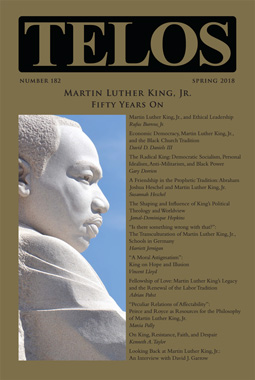Among the discouraging quandaries that the European Union has had to face in recent years, no one could have imagined that the United Kingdom and the United States, our historical, crucial allies, would turn their back on the EU, thus leaving it exposed to the global influence to Russia, Turkey, and Iran, not exactly friends of our open societies and polity. It would have been equally impossible to predict that so many supposedly enlightened, tolerant, and democratic European citizens would rally around xenophobic and anti-Semitic political parties while reviving the most obtuse and primitive ethnocentrism. All these ills, and most of all of Brexit and its aftermath, were interpreted by many as a fatal blow to the EU, in combination with other indicators that seemed to point to a general design failure of its unifying project. Nevertheless, many reliable commentators have expressed faith that the EU, at long last, would react to this long-standing issue.
|
Cary Nelson and Telos editor, Russell Berman, respond to Saree Makdisi and raise broader questions about the contemporary humanities. Read their essay at Fathom. Harriett Jernigan’s “‘Is there something wrong with that?’: The Transculturation of Martin Luther King, Jr., Schools in Germany” appears in Telos 182 (Spring 2018), a special issue commemorating the life and thought of Martin Luther King, Jr. Read the full article at the Telos Online website, or purchase a print copy of the issue in our online store. Individual subscriptions to Telos are now available in both print and online formats. As an occasional feature on TELOSscope, we highlight a past Telos article whose critical insights continue to illuminate our thinking and challenge our assumptions. Today, Jack Robert Edmunds-Coopey looks at Jeffrey Bussolini’s “Ongoing Founding Events in Carl Schmitt and Giorgio Agamben” from Telos 157 (Winter 2011). Jeffrey Bussolini’s article “Ongoing Founding Events in Carl Schmitt and Giorgio Agamben” is a discursive piece seeking to provide groundwork on the conception of the event and its theological and political dimensions. He coins this term “ongoing founding events” as a type of poetic gesture toward the movement of temporality to which events are founded, and which as a consequence of their founding then continue to contaminate the space around them. Bussolini claims that for Schmitt the event of decision generates sovereignty, and that within this basic movement, whether it be mythical or concrete reality at this point is unsure, becomes the generating and maintaining of political order. |
||||
|
Telos Press Publishing · PO Box 811 · Candor, NY 13743 · Phone: 212-228-6479 Privacy Policy · Data Protection Copyright © 2025 Telos Press Publishing · All Rights Reserved |
||||




The Massacre in Syria: An Appeal for Support
The ethnic cleansing in Syria is hardly a secret, but it continues unabated. A Syrian refugee and a Holocaust survivor have collaborated on an appeal that includes the following crucial paragraph:
Please read the full text here.
Continue reading →